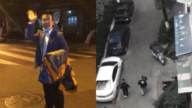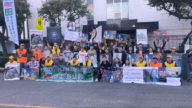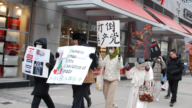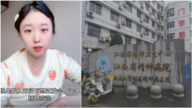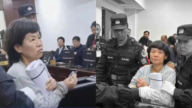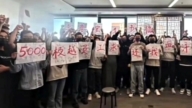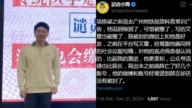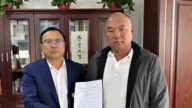【新唐人2012年12月07日訊】受到輿論廣泛關注的「河南截訪案」,日前被媒體證實,涉案的10名「黑保安」都是河南禹州農民,其中3人還未成年,「黑保安」的頭目王高偉的家屬說,王是受禹州信訪部門的邀請。評論指出,中共體制下的信訪部門僱傭截訪,侵犯人權,成千上萬人涉及,是國家集團的犯罪,官員卻可以逃脫責任。那麼,受害者是誰呢﹖
下面就跟本臺記者去了解:
北京朝陽區檢察院起訴書顯示,現年42歲的禹州農民王高偉,2月在朝陽區承租了涉案截訪的兩所「黑窩點」。王擔任截訪頭目,他的表舅,身為村官的付朝新,負責在老家招聘年輕人。
王高偉的父親透露,去年禹州市信訪局的人到他家,說給他兒子找了一個「好活」。王高偉進京後,打電話說,自己負責為政府送上訪人員,讓老人不要擔心。
涉案的3名未成年人,一名被逮捕,另兩名被取保候審,他們告訴媒體,付朝新曾在當地做廣告,至少招聘了十幾個人,付朝新還承諾,他們「進京鍛練」後,將進入小區「做保安」。
曾被關在朝陽區「黑窩點」的河南許昌14名訪民,其中4人4月底被截訪回家,5月初,她們再次返京報案,王高偉等7人因此被北京警方抓捕,10名訪民獲救。
11月28號,北京朝陽區法院開庭審理了這個案子。12月2號上午,各大媒體爭相報導,但當天下午,朝陽區法院「闢謠」說,消息不實。隨後,媒體通過採訪涉案訪民,證實了這一事件,從而將「截訪事件」推到輿論的風口浪尖,遭民間猛烈抨擊。
原山東大學教授孫文廣:「有一些農民、下崗工人他們生活所迫,要生存,到處打工,有時候能找到,有時候找不到,那麼政府僱他們做些事,每天給多少錢,他也就願意幹了,至於他幹的事到底違法不違法,有些人也不知道詳細的情況,那麼就會被僱傭來截訪,侵犯人權,那麼這些官員就可以用這種方法來逃脫責任了。」
目前,禹州市一位副市長已經赴京,與北京的有關部門「協調」這個案子,同時,許昌市也召開專門會議,研究如何處理。
大陸律師唐荊陵指出,「截訪」是中共維穩的一個重要組成部份,也是中共為了維持壟斷政治的集團犯罪。
唐荊陵:「這個不是一個小的犯罪集團,這是很多個犯罪集團,因為每個政府都有截訪的隊伍,他們都普遍使用非法拘禁,毆打、酷刑,各種各樣的犯罪手段,這個涉及到的人可能成千上萬, 而且涉及到很多官員,那些官員的階層不會太低的。」
唐荊陵指出,中共阻止訪民到北京,主要是怕人太多引發遊行示威,威脅到它的政權,所以就搞了一套很嚴酷的考核體系,如果一個地方太多人去北京上訪,當地的官員就會承擔政治上的風險。
唐荊陵:「所以地方當局在當局這種政治考核體制下,就有很強的驅動力,要去做這種維穩,那麼中央這些官僚們就能夠收穫政府穩定的好處,就不會面對這種大規模群眾上訪這樣一種政治潛在威脅,那麼地方官員,就是通過中央政府搞的這麼龐大的維穩基金,從這裡分享一部份的財政好處,它就變成一個黑產業鏈的犯罪集團。」
唐荊陵指出,即便這次截訪者獲刑,如果不去追訴其他的類似案件和涉案的官員,也解決不了大量以截訪為名鎮壓訪民的問題。
採訪編輯/李韻 後製/蕭宇
CCP Petition Office Hires Farmers to Intercept Petitioners
The case of Henan petitioner interception has become
a focus of public and media attention.
Media recently confirmed that the 10 implicated
interceptors are all farmers from Yuzhou, Henan province.
Three of them are even minors.
The father of gang leader Wang Gaowei says that
Yuzhou』s Petition Office invited his son to do it.
Commentators say this is an organized crime
in violation of human rights.
Tens of thousands of people are involved in such interceptions
in China, including Chinese Communist Party (CCP) officials.
However, those officials can easily offload liabilities,
but who has become ultimate victims?
Charges presented in a Beijing court show that Wang
Gaowei, 42, is a farmer from Yuzhou, Henan province.
The court said that in February, Wang rented two
residences in Chaoyang District in Beijing for detaining the intercepted petitioners.
Wang is head of the interceptor group.
His uncle, a village official, recruited young men in his town.
Wang Gaowei’s father says that officers from Yuzhou’s
Petition Office made a home visit, offering “a good job” to his son.
Wang, when staying in Beijing, told his father that he was
responsible for abducting petitioners for the authorities.
One of the three minors involved was arrested,
while the other two were released on bail.
They told the media that Wang Gaowei’s uncle advertised
in a local paper, and hired at least over a dozen people.
Wang’s uncle also promised them “security guard” positions
in Beijing’s residential zones after gaining “work experience”.
A total of 14 petitioners from Xuchang city in Henan province
were detained in Wang’s “black jails”.
Four of them were intercepted and sent back to Henan.
Early in May, they returned to Beijing and reported to the police.
Thus, the Beijing police captured Wang Gaowei
and six other interceptors. 10 petitioners were rescued.
On Nov. 28, Beijing Chaoyang District Court
trialed the case.
On Dec. 2, the case had become a heated topic for China’s media.
But the court dismissed it as a rumor,
saying the information was false.
Following the dismissal, media interviewed
the concerned petitioners, and verified the case.
Ultimately, strong public criticism was unleashed on further
exposure of the case.
Sun Wenguang retired professor of Shandong University:
“Some farmers or jobless workers seek jobs everywhere for survival.
So when the government pays them to do some work,
they’re usually willing to accept the offers.
They usually don’t know whether “the job” violates laws
or not, for being given little information on it.
That’s why they were hired as tools to intercept petitioners
and violate human rights.
But this becomes a way for the officials
to shirk their liabilities."
Yuzhou CCP authorities have now sent a deputy mayor to
Beijing to “coordinate” relevant departments in case proceedings.
Xuchang authorities held a special meeting
to study how to deal with the case.
Lawyer Tang Jingling comments that “petitioner-interception”
is an integral part of the CCP’s stability preservation policy.
It is also a proof of the CCP’s organized crime which aims to
sustain its political monopoly on power.
Tang Jingling: “It isn’t a small crime group,
but a complex composed of many crime groups.
Authorities in each locale has its own team tasked with
intercepting petitioners.
Their common approaches include illegal detention,
beatings, tortures, and various other criminal means.
This business most likely involves tens of thousands of
people in China, including those high-level officials."
Tang Jingling pointed out why the CCP prevents petitioners
from going to Beijing.
He says it fears too many people may stage demonstrations,
posing a threat to its regime.
Thus, it uses a very rigid system to assess local officials’
job performance.
If too many people from a region go to petition in Beijing,
the local officials would risk their political future.
Tang Jingling: “So such a political assessment system is
used as a driving force for local officials to 『maintain stability』.
The method can enables CCP central officials to enjoy
the regime’s stability and avoid seeing large-scale protests.
Plus local officials can gain financially by taking a share from
the central government’s huge stability preservation fund.
In this way, it has evolved into an underworld supply chain
for organized crime.”
Tang Jingling says merely sentencing interceptors,
like those in this case, without investigating
other similar cases and punishing implicated officials,
suppression of petitioners cannot truly be resolved.


